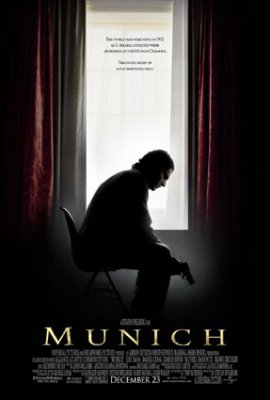Munich
I don't especially like Speilberg - but he gets credit for having balls taking on this one.
However, his comments at the end of this article are pretty much taken straight from the out of print (but very good, readable) book "Vengeance" by George Jonas; the book is based on a purported first-hand account of one Israeli Kidon team by one of the young Mossad assassins - who gradually began to find himself as much hunted (by his bosses, by European intelligence/police, as well as the PLO) as hunter, and who slowly began to experience himself as not that much different than the terrorists he pursued - except he was even more isolated and scared. If that's the perspective of the movie, it'll be very different than most people expect.
Spielberg, Kushner do film on Olympic massacre
Los Angeles Times
There's only one thing that Palestinian terrorist Abu Daoud and Israel's former spy chief Zvi Zamir could agree on: They're both publicly miffed that they weren't consulted about Steven Spielberg's new film, ``Munich,'' and that Spielberg relied on non-involved, objective people for advice.
The film focuses on the 1972 Olympic massacre of 11 Israeli athletes -- carried out by Black September, Daoud's organization -- and the Israeli retaliation, in which a Mossad team hunted down and killed the terrorists, the first instance of Israel's practice of ``targeted killings.''
Months before the Dec. 23 release of ``Munich,'' interested parties across the political spectrum are gearing up for the film, which has been shrouded in intense secrecy -- even by Hollywood standards.
Shot this past summer in Malta, Budapest, Paris and New York, ``Munich'' was written by Pulitzer Prize-winning playwright Tony Kushner (``Angels in America'') after passes by such notables as Oscar winner Eric Roth (``Forrest Gump''). It stars Eric Bana, Daniel Craig (the newly named James Bond) and Geoffrey Rush.
Spielberg is well known for his wrenching depiction of the Holocaust in ``Schindler's List'' and his philanthropic Shoah Foundation, which records the oral histories of Holocaust survivors. But until now he has largely refrained fromwading into the fray of Middle Eastern politics. Indeed, until he began filming, some associates privately wondered if he'd ever make the movie.
He has been proceeding cautiously, soliciting advice from a raft of political and public-relations experts, among them former Middle East envoy Dennis Ross, former president Bill Clinton, former White House spokesman Mike McCurry and Allan Mayer, a Hollywood public-relations executive who specializes in crisis management.
Spielberg is focusing on one of the seminal events in the modern history of terrorism, a blood bath that played out on U.S. TV and wound up publicizing what was then a cause little-known in the United States.
On Sept. 5, 1972, Palestinian guerrillas stormed an Olympic Village apartment building, killing two Israeli athletes and holding nine others hostage in an effort to gain the freedom of 200 Palestinian prisoners held by Israel. In a failed rescue attempt after a 20-hour standoff, the nine hostages -- as well as five terrorists and a German policeman -- were killed.
The attack dealt a blow to Israel's confidence with the message that there was no place in the world where its citizens could be safe. After the massacre, Israeli Prime Minister Golda Meir instructed Israeli intelligence agents to hunt down the perpetrators and kill them, in a campaign that was called ``Wrath of God.''
To this day, it remains a charged topic in Israel.
In a carefully worded statement issued over the summer to an Israeli paper, a U.S. paper and an Arab TV station, Spielberg, in his only public comment, explained his intentions: ``Viewing Israel's response to Munich through the eyes of the men who were sent to avenge that tragedy adds a human dimension to a horrific episode that we usually think about only in political or military terms. By experiencing how the implacable resolve of these men to succeed in their mission slowly gave way to troubling doubts about what they were doing, I think we can learn something important about the tragic standoff we find ourselves in today.''


